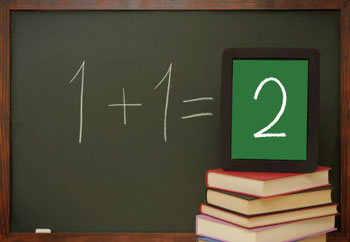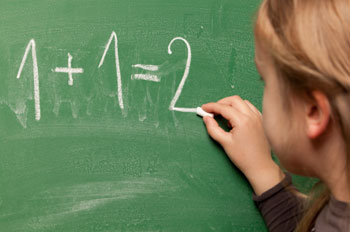2nd Grade Math: Learning Shapes
In 2nd grade, students manipulate shapes and learn to recognize their specific attributes, such as number of angles. You can reinforce these skills at home through fun, hands-on activities.

What Activities Can Help My Child Learn 2nd Grade Math Shapes?
In 2nd grade geometry, your child likely will learn to manipulate basic shapes, including rectangles, squares, triangles, circles and diamonds, by dividing them into halves, thirds and fourths. Some schools also may introduce more advanced polygons, like pentagons and octagons.
Additionally, 2nd graders may develop an awareness of the characteristics of shapes. For instance, they may learn that triangles have three angles, while pentagons have four. They also might learn that a cube is a 3-dimensional shape that has six equal faces.
When reviewing shapes with your child at home, choose activities that have a lot of repetition. Repeated exposure to terminology and the appearance of shapes can help solidify the material for your child. You also may want to choose games that allow your child to interact with different shapes.
Activities
Shape Hunt
When you and your child are out running errands, give him or her a piece of paper, and ask your child to look for shapes in the real world. Every time he or she sees an object that is a shape, have him or her draw a quick picture and label it. For example, if you're driving on the highway, your child might draw a rectangular exit sign.
Cut-Outs
Make cut-outs of all the shapes your child needs to recognize, like triangles, quadrilaterals, pentagons and hexagons. Then, ask him or her to use the cut-outs to make a picture. For example, he or she might make a person using a circle for a head and a rectangle for the body.
Name That Shape
Create cards with a drawing of a shape on one side. Sit across from your child and keep the cards face down on the table. On your turn, flip over a card. Whoever calls out the name of the shape first gets to keep the card, and whoever has the most cards by the end of the game wins. Feel free to repeat shapes in your deck because repetition can help your child remember his or her shapes.
Flashcards
If your child simply needs to memorize the shapes, you can make flashcards. Using blank note cards, write the name of a shape on one side, and draw a picture of it on the other. Then, use the flashcards to quiz your child on a regular basis.
Other Articles You May Be Interested In
-
MIND Games Lead to Math Gains

Imagine a math teaching tool so effective that it need only be employed twice per week for less than an hour to result in huge proficiency gains. Impossible, you say? Not so...and MIND Research Institute has the virtual penguin to prove it.
-
Should Math Be a Main Focus in Kindergarten?

Should kindergartners put away the building blocks and open the math books? According to recent research, earlier is better when it comes to learning mathematical concepts. But that could put undue pressure on kids, parents and even teachers.
We Found 7 Tutors You Might Be Interested In
Huntington Learning

- What Huntington Learning offers:
- Online and in-center tutoring
- One on one tutoring
- Every Huntington tutor is certified and trained extensively on the most effective teaching methods
K12

- What K12 offers:
- Online tutoring
- Has a strong and effective partnership with public and private schools
- AdvancED-accredited corporation meeting the highest standards of educational management
Kaplan Kids

- What Kaplan Kids offers:
- Online tutoring
- Customized learning plans
- Real-Time Progress Reports track your child's progress
Kumon

- What Kumon offers:
- In-center tutoring
- Individualized programs for your child
- Helps your child develop the skills and study habits needed to improve their academic performance
Sylvan Learning

- What Sylvan Learning offers:
- Online and in-center tutoring
- Sylvan tutors are certified teachers who provide personalized instruction
- Regular assessment and progress reports
Tutor Doctor

- What Tutor Doctor offers:
- In-Home tutoring
- One on one attention by the tutor
- Develops personlized programs by working with your child's existing homework
TutorVista

- What TutorVista offers:
- Online tutoring
- Student works one-on-one with a professional tutor
- Using the virtual whiteboard workspace to share problems, solutions and explanations